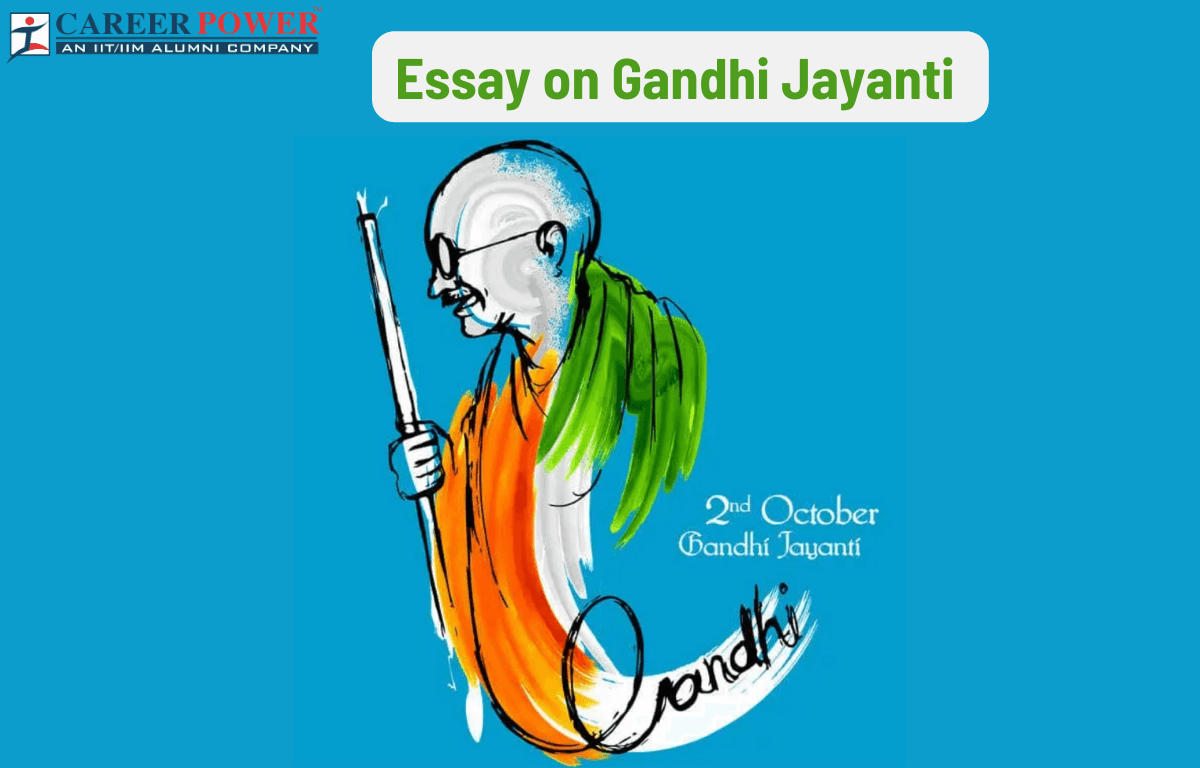Every year, on October 2nd, we celebrate Gandhi Jayanti to remember Mahatma Gandhi, the Father of our Nation. In 2024, it will be his 155th birth anniversary. Mohandas Karamchand Gandhi was a great leader who helped India gain freedom from British rule. He is famous for his peaceful methods like Non-Violence, the Salt March, and the Dandi March. His efforts made India free, and his ideas continue to inspire people worldwide. Gandhi Jayanti is one of the three national holidays in India, and on this day, we honor his life and contributions to the country’s independence. This essay will help students understand more about Mahatma Gandhi’s achievements and his role in India’s freedom struggle.
Gandhi Jayanti Essay in English in 100 words
In India, 2nd October is celebrated as the birthday of one of the greatest souls “Mohandas Karamchand Gandhi” commonly known as the “Bapu” or “Father of the Nation”. He was a great leader and a freedom fighter who played a key role in getting us the freedom from the colonial rule. This year we are going to celebrate his 155th Birth Anniversary on 2nd October 2024. To honor this great soul, 2nd October of every year is observed as a National Holiday as Banks, Government offices and institutions, and Educational institutions remain closed.
10 Lines on Gandhi Jayanti
- Gandhi Jayanti is celebrated on October 2nd every year to honor Mahatma Gandhi’s birthday.
- Mahatma Gandhi, also known as the “Father of the Nation,” played a key role in India’s freedom struggle.
- The day is marked to remember Gandhi’s principles of non-violence and truth.
- It is a national holiday in India, and people across the country pay homage to him.
- Schools celebrate Gandhi Jayanti by organizing prayer meetings and cultural programs.
- Students participate in activities like essay writing, speech competitions, and debates on Gandhi’s life and teachings.
- Teachers and students often clean their school premises to promote Gandhi’s vision of cleanliness.
- Documentaries and films about Gandhi’s life and his role in India’s independence are shown to students.
- Special assemblies are conducted where students present skits, songs, and poems about Gandhi.
- The day serves as a reminder to follow Gandhian principles in everyday life, particularly peace and Non-violence.
Gandhi Jayanti Essay in 200 Words for Class 5
Gandhi Jayanti is celebrated every year on 2nd October in India. It is the birthday of Mahatma Gandhi, who is known as the “Father of the Nation.” He was born in 1869 in Porbandar, Gujarat. Mahatma Gandhi is remembered for his great work in helping India gain freedom from British rule.
He believed in non-violence and truth. His way of fighting for freedom was very special because he didn’t use weapons or violence. Instead, he used peace and love to bring change. Gandhi led many important movements like the Salt March and Quit India Movement, which inspired many people.
On Gandhi Jayanti, schools, colleges, and government offices are closed. People across the country pay respect to Mahatma Gandhi by remembering his teachings and values. Many events, like prayer meetings and cleanliness drives, are organized to honor him.
Gandhi Jayanti is not only a national holiday but also a time to reflect on the importance of peace and non-violence in our lives. His life teaches us to be kind, truthful, and brave.
Gandhi Jayanti Essay in 500 Words
Gandhi Jayanti is a special day celebrated every year on October 2nd in India. It is the birthday of Mahatma Gandhi, who is known as the “Father of the Nation.” Gandhi played a big role in helping India gain freedom from British rule without using violence. He is respected not only in India but all over the world for his peaceful methods of fighting for justice.
Who Was Mahatma Gandhi?
Mahatma Gandhi was born on October 2, 1869, in a small town called Porbandar in Gujarat. His full name was Mohandas Karamchand Gandhi. Later, people started calling him “Mahatma,” which means “great soul.” Gandhi believed in truth, peace, and non-violence, which he called “Ahimsa.” He showed the world that it is possible to win rights and fight injustice without using weapons or violence.
Why is Gandhi Jayanti celebrated?
The 2nd of October is considered special as it marks the birth of two outstanding leaders and freedom fighters, Mahatma Gandhi and Lal Bahadur Shastri. The special event called Gandhi Jayanti is celebrated to recognize and remember the efforts and ideologies of Gandhiji or Bapuji. He is a man of simplicity as he always preferred to wear Khadi, and hand-woven clothes and boycotted the use of foreign goods. During the General Assembly meeting in the United Nations, this particular day was declared as ‘International Day of Non-Violence’ in 2007.
Gandhiji is best recognized as the ‘Father of Nation” for his contributions to the freedom struggle and to making India free from British colonial rule. His contributions to the freedom struggle are remarkable as he uprooted the British rulers from Indian Soil. Gandhiji relied on important principles such as Honesty, Integrity and Ahimsa known as Non-violence. He always believed ‘Ahimsa’ was the most potent weapon to combat with the British rulers. Hence to honour the principles and sacrifices of Gandhiji, Gandhi Jayanti is celebrated in India and also known to be the day of Non-violence in some countries.
Significance of Gandhi Jayanti
To pay tribute to the great leader and pure soul, Mahatma Gandhi’s principle of Non-violence is celebrated worldwide as ‘International Day of Non-violence’. The first International Day of Non-Violence was observed on 2nd October 2007 which coincided with Gandhi’s birthday. This day is celebrated in different ways by some countries throughout the world, which are discussed further:
India
As it is the birthplace of Mahatma Gandhi, this marks the special significance of the International Day of No-Violence. The Nation celebrates this day by organizing prayer meetings, seminars, lectures, and cultural programs thereby inculcating Gandhiji’s principles and teachings.
United States
Gandhiji’s principles and ideologies are not only restricted to India but are spread worldwide. To commemorate this special day, educational institutions, peace organizations, and community groups organize events and lectures to remember Mahatma’s contributions.
South Africa
Nelson Mandela was greatly influenced by Gandhiji’s principles and ideologies and followed the footprints of Mahatma to lead the Nation. As a remembrance of Gandhiji’s birthdate, the International Day of Non-Violence is celebrated widely in South Africa.
United Kingdom
The United Kingdom always pay homage to Gandhiji during his birthday at Tavistock Square, where the iconic statue of Mahatma Gandhi is present. The special day is commemorated through Vedic Prayers, Bhajans and Exhibition of Artwork.
Other countries
The International Day of Non-violence is celebrated in many other countries such as China, Rome, etc., with the main motive of providing peace education and aiming for conflict resolution.
Gandhiji’s Contributions towards Freedom
Mohandas Karamchand Gandhi was born on 2nd October 1869 into a merchant-less family in Porbandar, Gujarat, India which was under the Britishers rule. Later on, he travelled to England to pursue his law studies. He worked as a lawyer in South Africa, where he first experienced the racial discrimination and injustice committed by European rule against the African Blacks. He started several movements such as the Khadi movement to make use of fibres such as Jute or Khadi and weaved the same using a chakra. He started with the Non-Co-operation movement to make use of Indian Swadeshi goods and stopped the use of foreign goods. A major breakthrough movement is the ‘Quit India Movement’ to put an end to the British Colonial rule in India. He led a campaign called Salt satyagraha starting from Sabarmati Ashram along with his followers to reach Dandi to resist the payment of taxes levied on salt which was available free of cost to the common people.
Gandhi Jayanti 2024 celebrations in India
To commemorate this special day and to honour the birth of this great Indian soul, celebrations are organized in schools, and colleges by conducting various events such as competitive speeches on Gandhiji’s life history and writing essays on his contributions to the freedom struggle, rallies, etc., Bhajans are sung along with his favourite song, “Raghupati Raghava Raja Ram.” Major celebrations are performed in Gandhi Smriti, Raj Ghat, Delhi wherein many visitors garland his auspicious memorial made of black marble, which is the site of cremation. Floral tributes are also offered by various leaders and dignitaries from countries across the world.
On the whole, the auspicious day of Gandhi Jayanti marks the remembrance of the pure soul, and we as the citizens of India, follow his footprints to promote global peace, non-violence and integrity among various nations.



 Top 5 IPMAT Coaching in Noida – Your G...
Top 5 IPMAT Coaching in Noida – Your G...
 Top 5 IPMAT Coaching in Delhi NCR (Updat...
Top 5 IPMAT Coaching in Delhi NCR (Updat...
 Top 5 IPMAT Coaching in Gurugram for Com...
Top 5 IPMAT Coaching in Gurugram for Com...







